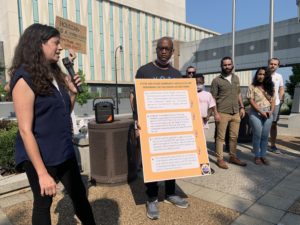
Nashville organizers are calling for city officials to prevent evictions when the moratorium ends on July 31.
The People’s Alliance for Transit, Housing and Employment announced four demands on Wednesday that they think will take the pressure off tenants.
Since February, a special housing diversionary court named L.E.G.A.C.Y. has been working to keep tenants in their homes: They’ve been mediating problems and getting landlords paid to prevent evictions.
And in this program, landlords have the power, since they must sign on to participate. Otherwise, the resident will go before a traditional evictions judge.
“We’re seeing landlord after landlord turning down the funds from the MAC program, the HOPE program,” PATHE Executive Director Jackie Sims says.
She’s talking about the city agency Metro Action Commission using federal money for their HOPE program to keep people in their homes. Out of almost 5,000, around 300 cases pulled their applications for a mix of reasons, including landlord refusal to cooperate.
“They simply want people out of their housing,” Sims says. “Because we live in a city now where you can command enormous amounts of rent for the same space if you just lap a bit of paint.”
 Ambriehl Crutchfield WPLN News
Ambriehl Crutchfield WPLN NewsPATHE Organizer Melissa Cherry reviews the four demands.
PATHE wants tenants to have housing stability. So, they want to add barriers for landlords who don’t want to use the city’s eviction prevention resources.
If that doesn’t work, they want tenants to get the rent assistance money directly, which Metro Action says the agency is able to do with the HOPE program.
Their four demands are to:
- Send all tenants facing possible eviction with an active HOPE program case to the L.E.G.A.C.Y. court
- Require landlords who don’t want to accept federal funds to to opt out of L.E.G.A.C.Y. if their tenant has already started an application with MAC
- Require landlords to apply for rent assistance before looking to get any monetary settlement against a tenant, and waive any late fees after tenant has applied for assistance
- Create a special advisor in the mayor’s office that can triage evictions, work with courts, help relocation of displaced residents and point out bad landlords.
Judge Rachel Bell, who runs the L.E.G.A.C.Y. court, says the program is optional and that the first demand can’t be mandated. Neither can point number three, she says: “This cannot be mandated” under Tennessee law, “but this can be suggested.”
The mayor’s office and Metro Action Commission didn’t address specific questions about implementing the demands.
“We are open to and looking forward to reviewing the demands by PATHE,” Metro Action Director of Communications Lisa McCrady tells WPLN News via email. “Right now, our priority is working with HOPE applicants with getting their applications completed.”
Meanwhile, the mayor’s office says it’s focused on preventing evictions: “The Metro Action Commission (MAC), housing courts, and the mayor’s office are already collaborating closely to help people,” a spokeswoman tells WPLN News. “We are open to — and look forward to reviewing — any proposals, such as PATHE’s, and are also going to stay focused on maximizing the resources we have to get assistance to residents.”

